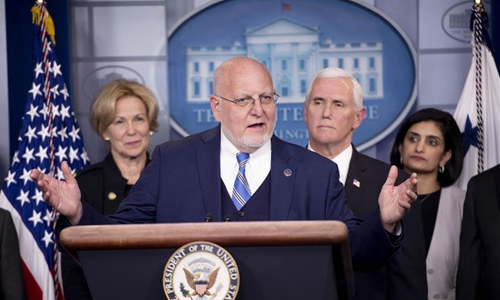HOME >> OPINION
How coronavirus reveals weakness in US healthcare system
By Mario Cavolo Source:Global Times Published: 2020/3/4 14:38:40

Director of the U.S. Centers for Disease Control and Prevention(CDC) Robert Redfield (front) speaks during a press conference with members of the White House coronavirus task force in the White House in Washington D.C., the US, on Monday. Photo: Xinhua
Is the Chinese experience and response in dealing with the virus outbreak suitable for other countries and regions?
In a word, no, they are not, but they could be. I offer up this rather stark answer as a means of pointing out the fundamental differences between the two main systems of governance in the world; the arguably more authoritarian, central planning governments such as China's, and the more democratic systems such as that of the US.
Intelligent, sensible observation always leads to the same conclusions. China is in so many ways a terrific country with a remarkably capable government, which faces plenty of very difficult challenges. Chinese President Xi Jinping has publicly acknowledged the country's faults and that is exactly why he has so aggressively focused on his well-known anti-corruption drive.
America is also a terrific country yet it now clearly and unfortunately has a more broken, divided government, suffering from persistent governance problems since the post-Reagan period. Despite the obvious political and societal divisions, we also declare America a wonderful country. When it comes to the governance system and policy response to a healthcare crisis, however, we see two entirely different approaches and ideologies.
The response in the US to COVID-19 will rely more on the common sense of the individual and their family's ability to act to protect themselves. This may be successful but my concern is that the US will respond long after the outbreak will reach many thousands, and suffer its own "Wuhan nightmare." While the Trump administration, Centers for Disease Control and Prevention (CDC) and the US Department of Health and Human Services (HHS) do provide guidance, they are relatively unprepared compared to China. They don't have enough test kits at hospitals, and are facing a far greater shortage than experienced in China's healthcare system. Fox News medical expert Dr Marc Siegel said Americans who are worried about the coronavirus outbreak shouldn't buy face masks to protect themselves against it. He failed to mention some infected people can be asymptomatic and unknowingly spread the virus to hundreds of others. Incidents like these cause us to lose confidence in American experts.
Is fighting the coronavirus a competition between two systems?
We must use the word "competition" to highlight how inappropriate and irresponsible it is for any leader of any country during a humanitarian crisis to play politics instead of offering compassion and unity and trying to save people's lives. Why, when facing such a humanitarian crisis, do we still have to tolerate a barrage of disrespectful, misleading anti-China headlines? We need to look no further than the WHO itself, to clearly understand that China has given the world a gift of its experience and expertise by sharing with the world vast amounts of knowledge about the virus, while pulling together a united response with the government and the people to dramatically slow the spread of the virus. Dr Zhong Nanshan noted the virus would peak at the end of February and it has. He had factored in the broad, aggressive, efficient response in China, which will be very difficult to replicate elsewhere.
This viral outbreak has served as a proxy to reveal the underlying competition and politics, mostly being flung across the table from West to East. One can easily feel it is an unhelpful distraction that is causing even greater damage and discord, instead of focusing on saving people's lives.
Is the US healthcare and medical system capable of handling the epidemic?
The strength of the US medical system is its highly competent doctors, standards and professionalism. The weakness is found in the outrageously high cost of for-profit hospitals and health insurance, which has co-opted and corrupted the industry to the detriment of the people who need and don't have reasonable healthcare coverage. Those lucky enough to have insurance face sky-high deductibles and co-pays that can cost thousands of dollars, forcing them to go without medical help because they can't afford it.
Take the case of a Florida man who was feeling ill, and as a good citizen went to a hospital to be tested for the coronavirus, only to find he had the annual flu. He would have normally gone to a drug store for some symptom-relieving medication, but instead ended up with a medical bill of more than $3,000.
Now consider what is likely to happen to the 45 percent of US households that have no savings. When test kits do become available in the US, will people be able to afford them? This is the absurdity of the US system and I fear it will ultimately cause more deaths. Meanwhile, across the Pacific, very low-cost, efficient healthcare and health insurance is available all across China.
This is a matter the Trump administration, CDC and HHS must somehow address to avoid a chaotic and ruinous economic impact. While many problems remain, I am confident as I witness the Trump administration definitely strengthening the middle class over the past four years. Let's hope they reign in the excesses of the billionaires and address the serious weaknesses of healthcare sector. I have a sense the arrival of this coronavirus will act as an impetus to address both.
The author is author, advisor & CEO, M Communications Group. He has lived in China for 21 years. opinion@globaltimes.com.cn
Posted in: VIEWPOINT